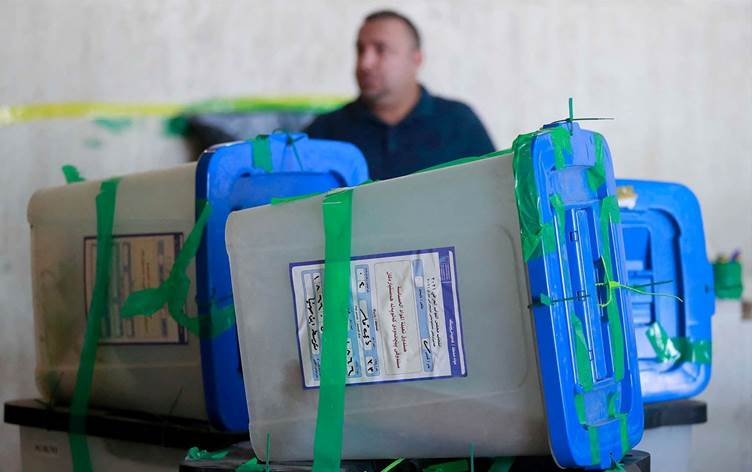ERBIL, Kurdistan Region - Iraq’s electoral body has responded to a number of concerns raised by Kurdistan Region President Nechirvan Barzani regarding the upcoming parliamentary elections, including issues relating to the electronic voting machines and the number of seats allocated for Halabja, the body’s spokesperson told Rudaw on Wednesday.
President Barzani on March 11 addressed a letter to Iraq’s Independent High Electoral Commission (IHEC), highlighting four main concerns relating to the mechanisms of carrying out the Region’s elections scheduled for June 10: Voting machines not recognizing voter fingerprints, the number of seats allocated for Halabja, suggesting the process by solely run by the commission’s board in the Region, and the timeline of announcing the results.
IHEC spokesperson Jumana al-Ghalai said that the electoral body has addressed a letter to President Barzani to answer the concerns and suggestions. She said that issues relating to fingerprints and voting machines are “natural” by international standards, and around nine to 15 percent of voters in Iraq also face issues with the machines recognizing their fingerprints.
“The fingerprints issue depends on how the fingerprint was taken during the biometric registration process. The fingerprint changes based on the voter’s condition. If certain individuals have diabetes or skin diseases, or are old and subjected to chemicals, the machines may not read their fingerprints,” Ghalai told Rudaw’s Nahro Mohammed on Wednesday.
The ruling Kurdistan Democratic Party (KDP) last week announced that it will not be partaking in the upcoming elections in light of recent measures taken by the Iraqi Federal Supreme Court deemed by the party to be detrimental to the Kurdistan Region. One of the reasons for the withdrawal cited by the KDP was that the voting machines did not recognize the fingerprints of around 400,000 individuals, making up approximately 20 percent of all eligible voters.
Ghalai said that the rate of unreadable fingerprints across the Kurdistan Region provinces has decreased from 2021’s Iraqi parliament elections to 2023’s biometric registration.
“The electoral law allows five percent of those whose fingerprints are unreadable to cast ballots and the IHEC is committed to that.”
Unlike in previous elections, which followed a single constituency system, the June vote will see the Kurdistan Region divided into four constituencies, based on a February ruling from the Iraqi top court. Sulaimani will have the most number of seats with 38, followed by Erbil with 34, Duhok with 25, and Halabja with three.
The KDP had criticized the number of seats allocated to Halabja, calling it “unfair”.
“The number of seats in the Halabja constituency were in accordance with the electoral law, the decision of the Federal Supreme Court, and international standards,” said Ghalai, stressing that the seats were distributed after reviewing the province’s data and information.
In response to the suggestion for the elections being carried out exclusively by IHEC’s Kurdistan Region board, the electoral body said that a ministerial central committee was established on March 17 and started its work in the Kurdistan Region. The committee has two Kurdish members, and its secondary committees will also consider appointing Kurdish members, according to Ghalai.
In regards to requesting a Kurdistan Region representative for information technology at the technical center, the spokesperson said that the IHEC has a committee that oversees the work of the inspection firm, and two members of the committee will be IT experts from the Kurdistan Region.
“After 24 hours from the elections, the early results for parties and candidates will be announced on the IHEC website; after 72 hours the early results for the voting stations will be published on the website,” said Ghalai regarding the fourth point raised by President Barzani.
In a letter to Iraq’s Supreme Judicial Council Chairman Faeq Zidan on March 11, President Barzani stressed that it was important for the Kurdistan Region to have a representative on the review board for appeals and complaints relating to the Kurdistan parliamentary elections.
Rudaw understands that the judiciary has responded to President Barzani’s request, asking him to submit three names for the position.
The June 10 election will be unique in the Kurdistan Region’s parliamentary history, with fewer seats in the legislature, a new constituency system, and the poll being administered by the federal commission for the first time due to disagreements between the main Kurdish parties that resulted in a failure to renew the mandate of the regional electoral body as required by law.
Kurdistan Region President Nechirvan Barzani earlier this month announced that the new date for the elections was June 10, after being delayed for more than a year and a half.
The election was initially scheduled for October 2022, but was repeatedly postponed because of disagreements between the political parties and pending court cases in Baghdad.
Updated at 4:20pm









Comments
Rudaw moderates all comments submitted on our website. We welcome comments which are relevant to the article and encourage further discussion about the issues that matter to you. We also welcome constructive criticism about Rudaw.
To be approved for publication, however, your comments must meet our community guidelines.
We will not tolerate the following: profanity, threats, personal attacks, vulgarity, abuse (such as sexism, racism, homophobia or xenophobia), or commercial or personal promotion.
Comments that do not meet our guidelines will be rejected. Comments are not edited – they are either approved or rejected.
Post a comment